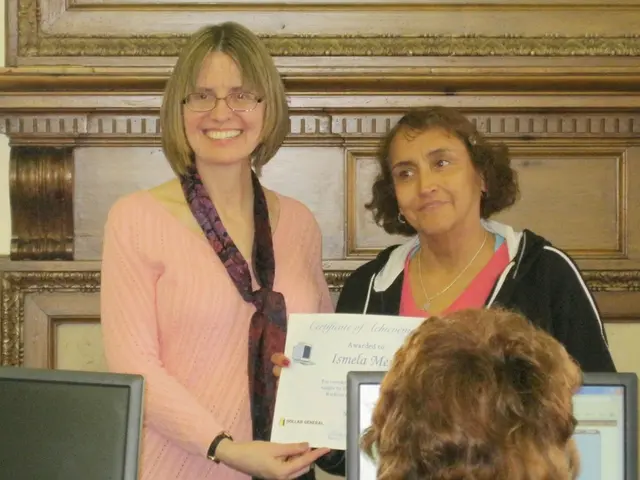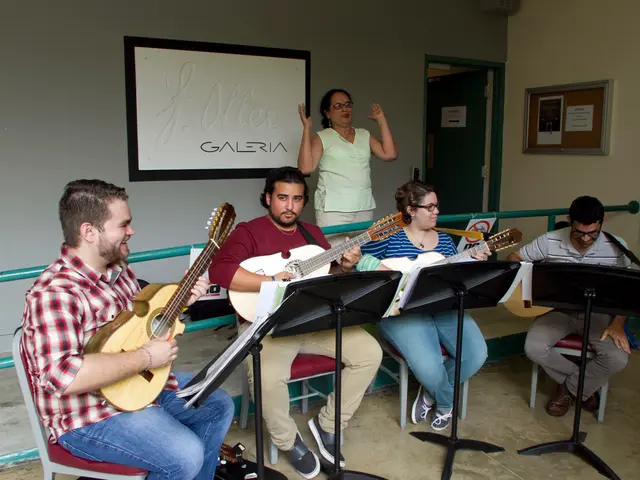Workplace Evolution, Technological Advancements, and Workforce Training: Significant Insights from the World Economic Forum's Job Reconstruction Meeting
In the aftermath of the COVID-19 pandemic, the global jobs market is facing unprecedented challenges. To address these issues, the World Economic Forum (WEF) hosted the Jobs Reset Summit, bringing together over 1,000 leaders from business, international organisations, and government to discuss the future of work, reskilling and upskilling the workforce, education, and the economic response to the pandemic's impact on the labor market.
One of the key themes that emerged from the summit was the need for a multi-pronged approach to protect jobs and promote employment growth in a post-pandemic world. Economists such as Raghuram Rajan, Rain Newton-Smith, and Tamar Kitiashvili emphasised the importance of this approach, which combines labor market reforms, technological adaptation, organisational restructuring, and comprehensive workforce development focused on green and digital skills.
Addressing Labor Market Tightness and Skills Gaps
Post-pandemic labor markets, particularly in advanced economies, face tightness due to demographic shifts, sector-specific shortages, and changing workforce participation. Countries are adopting diverse strategies such as streamlining immigration policies, encouraging workforce development and targeted retraining, and leveraging older workers through specialized programs.
Embracing Workforce Development and Reskilling
There is a strong emphasis on developing green skills and other future-oriented competencies to ensure workers can participate in emerging sectors. This requires targeted training and innovation across regions to prepare the workforce for a post-pandemic economy that demands new skills, especially digital and sustainability-related capacities.
Managing Technology-Driven Job Disruptions
The World Economic Forum survey highlights that 41% of businesses expect AI-related job disruptions within five years. While layoffs are anticipated due to automation and AI adoption, the job market will simultaneously see an increase in tech jobs related to big data, fintech, and AI itself. This dual dynamic calls for adaptive labor policies that balance job protection with fostering innovation and new job creation.
Reshaping Organizational Structures
Economists and HR leaders advocate for transforming firm hierarchies to be more agile and skills-focused. This includes “delayering” management to reduce bureaucracy, promote productivity, and prepare the next generation of leadership. A flatter organisational structure can motivate workers and improve connectivity between employees and senior leadership. Similarly, HR practices are moving toward cross-functional teams capable of broader collaboration rather than traditional segmented roles.
Responsive Labor Policies and Worker Protections
Certain sectors like construction are addressing workforce shortages through supportive policies such as reintroducing worker protection legislation and expecting staffing increases despite uncertainty. These policy frameworks aim to balance employer flexibility with the need for worker rights and protections in a recovering economy.
Tamar Kitiashvili, deputy minister at Georgia's Ministry of Education, Science, Culture and Sport, suggested that the response to the crisis might include the reshaping of establishments and governance models to become more responsive and to accelerate the closing of the skills gap. Her suggestion does not repeat earlier mentioned strategies such as stimulus packages, interest rate cuts, or asset acquisitions. Instead, it aims to make the economy more dynamic by adapting beyond the measures already implemented.
Rain Newton-Smith, chief economist at the CBI, stated that the strategy of using the financial system to build a bridge to the other side of the crisis is highly expensive and that more adjustment is needed in the economy. The need for a more dynamic response to the crisis makes the decisions from here on in more difficult.
The global economy suffered significant damage due to the COVID-19 pandemic. Our group's own research indicates that the size of the stimulus package and the effective implementation of short-time work programs have the largest positive impact on a country's ability to mitigate the economic damage caused by the pandemic. Governments and central banks responded with stimulus packages totaling over $11 trillion, interest rate cuts, and asset acquisitions to prevent financial collapse.
In conclusion, the insights shared at the WEF Jobs Reset Summit underscore the need for a comprehensive and adaptive approach to protect jobs and promote employment growth in the post-pandemic world. By focusing on labour market reforms, technological adaptation, organisational restructuring, and comprehensive workforce development, we can build a more resilient and inclusive economy that is prepared for the challenges of the future.
- In the context of a post-pandemic world, the emphasis on workforce development and reskilling becomes paramount to ensure workers acquire green skills and future-oriented competencies, allowing them to participate in emerging sectors like big data, fintech, and AI.
- The World Economic Forum's survey shows that 41% of businesses anticipate AI-related job disruptions within five years, highlighting the necessity for adaptive labor policies that balance job protection with fostering innovation and new job creation.




